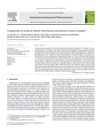2 citations,
July 2023 in “Cosmetics” Surfactants in shampoos and conditioners remove some but not all lipids from hair, and more research is needed to understand their full impact.
 2 citations,
December 2021 in “ScienceRise”
2 citations,
December 2021 in “ScienceRise” The best way to extract oil from Urtica dioica roots is by using corn oil, a 1:5 ratio of raw material to extract, extracting for 6 hours, and using the maceration method.
[object Object]  49 citations,
September 2008 in “International journal of pharmaceutics”
49 citations,
September 2008 in “International journal of pharmaceutics” Artificial sebum L closely mimics human sebum for drug delivery research.
 18 citations,
June 2017 in “Proceedings of the National Academy of Sciences of the United States of America”
18 citations,
June 2017 in “Proceedings of the National Academy of Sciences of the United States of America” A gene called Gk5 controls lipid production in the skin and affects hair growth.
 451 citations,
March 2005 in “Endocrine Reviews”
451 citations,
March 2005 in “Endocrine Reviews” The enzyme steroid sulfatase is linked to breast cancer and other conditions, and inhibitors are being developed for treatment.
 47 citations,
May 2021 in “Polymers”
47 citations,
May 2021 in “Polymers” Jojoba oil is highly valued for its diverse medicinal and industrial uses.
 23 citations,
June 2010 in “Journal of Investigative Dermatology”
23 citations,
June 2010 in “Journal of Investigative Dermatology” A mutation in the Soat1 gene causes hair structure defects and other health issues in AKR/J mice.
[object Object]  36 citations,
September 2009 in “Journal of Cellular and Molecular Medicine”
36 citations,
September 2009 in “Journal of Cellular and Molecular Medicine” New treatments targeting skin stem cells show promise for skin repair, anti-aging, and cancer therapy.
 17 citations,
December 2015 in “International Journal of Cosmetic Science”
17 citations,
December 2015 in “International Journal of Cosmetic Science” Visible light can improve skin disorders and hair loss, but more research is needed to understand long-term effects.
 1 citations,
January 2015 in “Journal of nutrition & health”
1 citations,
January 2015 in “Journal of nutrition & health” Fish oil improves skin health in people with diabetes and high cholesterol.
 10 citations,
December 2015 in “Clinics in Dermatology”
10 citations,
December 2015 in “Clinics in Dermatology” Diabetes can lead to blindness and skin problems, and managing blood sugar and blood pressure is crucial to prevent these complications.
 July 2015 in “Cambridge University Press eBooks”
July 2015 in “Cambridge University Press eBooks” Androgens like testosterone affect skin health and can lead to conditions such as acne and hair loss, with various treatments available.
 434 citations,
October 2003 in “PTR. Phytotherapy research/Phytotherapy research”
434 citations,
October 2003 in “PTR. Phytotherapy research/Phytotherapy research” Natural products in cosmetics are beneficial for skin and hair care with low toxicity.
 74 citations,
March 1963 in “Archives of Dermatology”
74 citations,
March 1963 in “Archives of Dermatology” Triparanol therapy can cause hair loss and skin dryness without inflammation or damage to hair follicles or skin structures.
 17 citations,
January 2011 in “Indian journal of dermatology, venereology, and leprology”
17 citations,
January 2011 in “Indian journal of dermatology, venereology, and leprology” A rare genetic skin condition usually affecting males was found in a 9-year-old girl.
 87 citations,
March 2014 in “Biochimica et Biophysica Acta (BBA) - Molecular and Cell Biology of Lipids”
87 citations,
March 2014 in “Biochimica et Biophysica Acta (BBA) - Molecular and Cell Biology of Lipids” Cholesterol sulfate buildup due to a genetic mutation disrupts the skin barrier, leading to the scaling skin seen in X-linked ichthyosis.
 14 citations,
December 2010 in “Journal of human genetics”
14 citations,
December 2010 in “Journal of human genetics” A Japanese patient with IFAP syndrome had a severe MBTPS2 gene mutation but showed milder symptoms than previously observed cases.
 39 citations,
June 2017 in “Journal of Applied Research on Medicinal and Aromatic Plants”
39 citations,
June 2017 in “Journal of Applied Research on Medicinal and Aromatic Plants” Plant-based ingredients are effective and safe for modern skincare products.
 25 citations,
July 2019 in “Experimental Dermatology”
25 citations,
July 2019 in “Experimental Dermatology” Cholesterol balance is important for hair health, and problems with it can lead to hair loss conditions.
9 citations,
August 2021 in “International journal of molecular sciences” PPARγ is essential for maintaining healthy skin, controlling inflammation, and ensuring proper skin barrier function.
 6 citations,
November 2014 in “The journal of investigative dermatology/Journal of investigative dermatology”
6 citations,
November 2014 in “The journal of investigative dermatology/Journal of investigative dermatology” Stephen Rothman made important discoveries in dermatology, including the use of PABA in sunscreens, but never profited from his work.
 3 citations,
December 2022 in “Cells”
3 citations,
December 2022 in “Cells” Cannabinoids like CBD and THC may help treat non-cancer skin diseases, but more research is needed.
14 citations,
July 2022 in “Nutrients” Vitamin A is important for healthy skin and hair, influencing hair growth and skin healing, but UV light reduces its levels.
 1 citations,
January 2022 in “Journal of Biosciences and Medicines”
1 citations,
January 2022 in “Journal of Biosciences and Medicines” Understanding how androgens and their receptors work can lead to improved treatments for skin diseases.
 28 citations,
September 2013 in “Expert Opinion on Therapeutic Patents”
28 citations,
September 2013 in “Expert Opinion on Therapeutic Patents” New resveratrol-related compounds show promise for treating various health issues but need more research for clinical use.
 49 citations,
October 2014 in “International Scholarly Research Notices”
49 citations,
October 2014 in “International Scholarly Research Notices” Eclipta alba has many health benefits and contains compounds with potential for drug development.
 48 citations,
February 2013 in “Molecular and Cellular Endocrinology”
48 citations,
February 2013 in “Molecular and Cellular Endocrinology” The protein StAR is found in 17 different organs and can affect hair loss and brain functions, but its full role is not yet fully understood.
44 citations,
January 2004 in “American journal of clinical dermatology” Understanding genetic mutations helps diagnose and treat skin disorders like ichthyosis.
16 citations,
September 2019 in “Journal of biological chemistry/The Journal of biological chemistry” Mice without certain skin enzymes have faster hair growth and bigger eye glands.
5 citations,
January 2015 in “Case reports in medicine” A baby was diagnosed with IFAP syndrome due to a new genetic mutation, showing severe skin and developmental issues.























